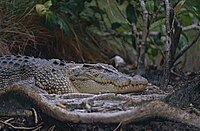Template:Did you know/Saltwater crocodile: Difference between revisions
mNo edit summary Tag: Reverted |
mNo edit summary |
||
| (2 intermediate revisions by the same user not shown) | |||
| Line 1: | Line 1: | ||
'''[[Saltwater crocodile (Crocodylus porosus)]]''' | |||
[[File:Saltwater Crocodile (Crocodylus porosus) (9730765533).jpg|200x200px|frameless|right|alt=Saltwater Crocodile (Crocodylus porosus)|Saltwater Crocodile (Crocodylus porosus)]] | [[File:Saltwater Crocodile (Crocodylus porosus) (9730765533).jpg|200x200px|frameless|right|alt=Saltwater Crocodile (Crocodylus porosus)|Saltwater Crocodile (Crocodylus porosus)]] | ||
* It is the largest living reptile, reaching over 6 meters in length and weighing over 1,000 kg. | * It is the largest living reptile, reaching over 6 meters in length and weighing over 1,000 kg. | ||
* It inhabits both saltwater and freshwater habitats across India, Southeast Asia, and northern Australia. | * It inhabits both saltwater and freshwater habitats across India, Southeast Asia, and northern Australia. | ||
* It has the highest bite force of any animal, with a pressure of 2.5 tons per square inch. | * It has the highest bite force of any animal, with a pressure of 2.5 tons per square inch. | ||
* It is an opportunistic predator that can eat almost any animal, including mammals, reptiles, birds, fish, and even sharks and other crocodiles. | |||
* It can swim at speeds of 15 miles per hour, holding its limbs against its body to become more streamlined. | |||
Latest revision as of 19:11, 12 January 2024
Saltwater crocodile (Crocodylus porosus)

- It is the largest living reptile, reaching over 6 meters in length and weighing over 1,000 kg.
- It inhabits both saltwater and freshwater habitats across India, Southeast Asia, and northern Australia.
- It has the highest bite force of any animal, with a pressure of 2.5 tons per square inch.
- It is an opportunistic predator that can eat almost any animal, including mammals, reptiles, birds, fish, and even sharks and other crocodiles.
- It can swim at speeds of 15 miles per hour, holding its limbs against its body to become more streamlined.
